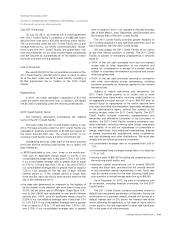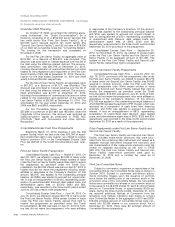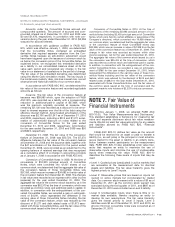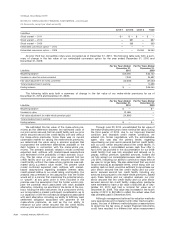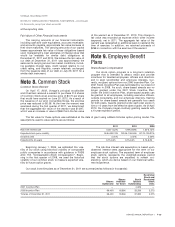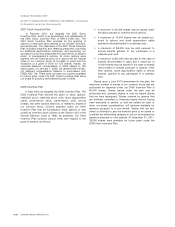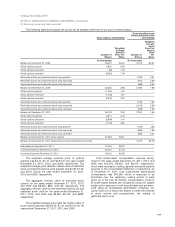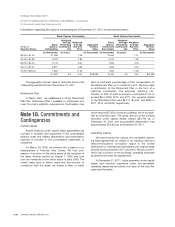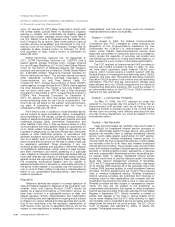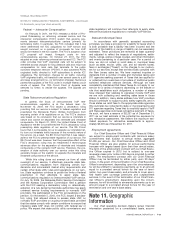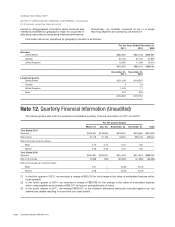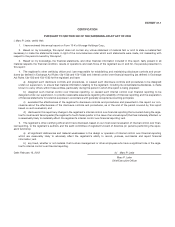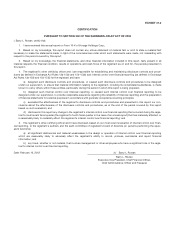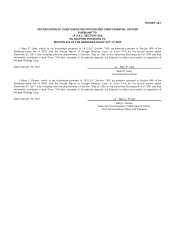Vonage 2011 Annual Report Download - page 87
Download and view the complete annual report
Please find page 87 of the 2011 Vonage annual report below. You can navigate through the pages in the report by either clicking on the pages listed below, or by using the keyword search tool below to find specific information within the annual report.
VONAGE HOLDINGS CORP.
NOTES TO CONSOLIDATED FINANCIAL STATEMENTS—(Continued)
(In thousands, except per share amounts)
Federal — Intercarrier Compensation
On February 9, 2011, the FCC released a Notice of Pro-
posed Rulemaking on reforming universal service and the
intercarrier compensation (“ICC”) system that governs pay-
ments between telecommunications carriers primarily for
terminating traffic. In particular, the FCC indicated that it has
never determined the ICC obligations for VoIP service and
sought comment on a number of proposals for how VoIP
should be treated in the ICC system. The FCC’s adoption of an
ICC proposal will impact Vonage’s costs for tele-
communications services. On October 27, 2011, the FCC
adopted an order reforming universal service and ICC. The FCC
order provides that VoIP originated calls will be subject to
interstate access charges for long distance calls and reciprocal
compensation for local calls that terminate to the public
switched telephone network (“PSTN”). It also subjected PSTN
originated traffic directed to VoIP subscribers to similar ICC
obligations. The termination charges for all traffic, including
VoIP originated traffic, will transition over several years to a bill
and keep arrangement (i.e., no termination charges). Numerous
parties filed appeals of the FCC order in multiple federal circuit
courts of appeal. The 10th Circuit Court of Appeals was
selected by lottery to decide the appeals. The appeals are
pending.
State Telecommunications Regulation
In general, the focus of interconnected VoIP tele-
communications regulation is at the federal level. On
November 12, 2004, the FCC issued a declaratory ruling
providing that our service is subject to federal regulation and
preempted the Minnesota Public Utilities Commission from
imposing certain of its regulations on us. The FCC’s decision
was based on its conclusion that our service is interstate in
nature and cannot be separated into interstate and intrastate
components. On March 21, 2007, the United States Court of
Appeals for the 8th Circuit affirmed the FCC’s declaratory ruling
preempting state regulation of our service. The 8th Circuit
found that it is impossible for us to separate our interstate traf-
fic from our intrastate traffic because of the nomadic nature of
the service. As a result, the 8th Circuit held that it was reason-
able for the FCC to preempt state regulation of our service. The
8th Circuit was clear, however, that the preemptive effect of the
FCC’s declaratory ruling may be reexamined if technological
advances allow for the separation of interstate and intrastate
components of the nomadic VoIP service. Therefore, the pre-
emption of state authority over our service under this ruling
generally hinges on the inability to separate the interstate and
intrastate components of the service.
While this ruling does not exempt us from all state
oversight of our service, it effectively prevents state tele-
communications regulators from imposing certain bur-
densome and inconsistent market entry requirements and
certain other state utility rules and regulations on our serv-
ice. State regulators continue to probe the limits of federal
preemption in their attempts to apply state tele-
communications regulation to interconnected VoIP service.
On July 16, 2009, the Nebraska Public Service Commission
and the Kansas Corporation Commission filed a petition
with the FCC seeking a declaratory ruling or, alternatively,
adoption of a rule declaring that state authorities may apply
universal service funding requirements to nomadic VoIP
providers. We participated in the FCC proceedings on the
petition. On November 5, 2010, the FCC issued a declara-
tory ruling that allowed states to assess state USF on
nomadic VoIP providers on a going forward basis provided
that the states comply with certain conditions to ensure that
imposing state USF does not conflict with federal law or
policy. We expect that state public utility commissions and
state legislators will continue their attempts to apply state
telecommunications regulations to nomadic VoIP service.
State and Municipal Taxes
In accordance with generally accepted accounting
principles, we make a provision for a liability for taxes when it
is both probable that a liability has been incurred and the
amount of the liability or range of liability can be reasonably
estimated. These provisions are reviewed at least quarterly
and adjusted to reflect the impacts of negotiations, settle-
ments, rulings, advice of legal counsel, and other information
and events pertaining to a particular case. For a period of
time, we did not collect or remit state or municipal taxes
(such as sales, excise, utility, use, and ad valorem taxes),
fees or surcharges (“Taxes”) on the charges to our custom-
ers for our services, except that we historically complied with
the New Jersey sales tax. We have received inquiries or
demands from a number of state and municipal taxing and
911 agencies seeking payment of Taxes that are applied to
or collected from customers of providers of traditional public
switched telephone network services. Although we have
consistently maintained that these Taxes do not apply to our
service for a variety of reasons depending on the statute or
rule that establishes such obligations, a number of states
have changed their statutes to expressly include VoIP and
we are now collecting and remitting sales taxes in those
states. In addition, many states address how VoIP providers
should contribute to support public safety agencies, and in
those states we remit fees to the appropriate state agencies.
We could also be contacted by state or municipal taxing and
911 agencies regarding Taxes that do explicitly apply to VoIP
and these agencies could seek retroactive payment of Taxes.
As such, we have a reserve of $2,231 as of December 31,
2011 as our best estimate of the potential tax exposure for
any retroactive assessment. We believe the maximum esti-
mated exposure for retroactive assessments is approx-
imately $5,000 as of December 31, 2011.
Employment Agreements
Our Chief Executive Officer and Chief Financial Officer
are subject to employment contracts with minimum salary
commitments that, subject to annual review, aggregate
$1,435 per annum. Our Chief Executive Officer and Chief
Financial Officer are also eligible for annual performance
bonuses with targets based upon their then annual salary.
The term of the employment contract with our Chief Execu-
tive Officer expires in 2012 but is subject to one-year
renewals unless prior notice of 90 days is provided by either
party. The employment contract with our Chief Financial
Officer may be terminated by either party upon 30 days’
notice. In the event of the termination of our Chief Executive
Officer’s employment, depending upon the circumstances,
he will be entitled to severance payments up to an amount
equal to a prorated annual bonus for the year of termi-
nation, two year’s base salary, and amounts to cover speci-
fied health care coverage premiums and outplacement
services. In the event of the termination of our Chief Finan-
cial Officer’s employment, depending upon the circum-
stances, he will be entitled to severance payments up to an
amount equal to a prorated annual bonus for the year of
termination and one year’s base salary.
Note 11. Geographic
Information
Our chief operating decision-makers review financial
information presented on a consolidated basis, accom-
VONAGE ANNUAL REPORT 2011 F-31


